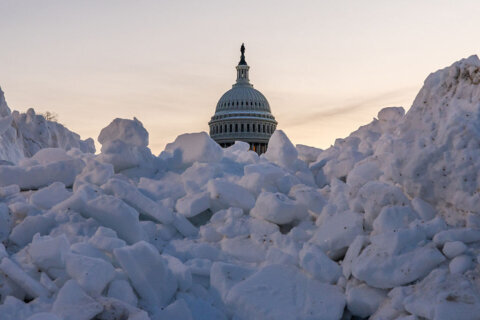Virginia Attorney General Jason Miyares is asking a Loudoun County judge to exclude the public from next Monday’s hearing in the county School Board’s lawsuit seeking to halt further actions by a special grand jury.
In a new filing obtained by WTOP, Miyares said “There is no First Amendment right of access to grand jury proceedings,” and that opening the hearing to the public would damage the normally secret criminal investigatory process of the grand jury. Miyares is also asking that the transcript from the hearing be sealed.
Miyares convened the special grand jury to look into how the school system handled two sexual assaults by the same high school student last year.
As WTOP first reported in May, the School Board is seeking a temporary injunction to prohibit further action by the special grand jury. In its lawsuit, the board said an executive order issued by Gov. Glenn Youngkin on his first day in office went beyond his legal power, and that the special grand jury empaneled by Miyares is being used unlawfully.
Miyares has previously called the lawsuit “legally baseless” and asked that it be dismissed: “The Complaint seeks to shut down or control a lawfully instituted criminal investigation and any subsequent prosecutions.”
“Since the 17th century, grand jury proceedings have been closed to the public, and records of such proceedings have been kept from the public eye,” wrote assistant attorney general Thomas Sanford in Miyares’ filing, citing previous court opinions.
“In light of that history, it is unsurprising that courts have consistently held that there is no First Amendment right of access to grand jury proceedings, nor do First Amendment protections extend to ancillary materials dealing with grand jury matters.”
If the circuit court judge decides to keep the hearing open to the public, Miyares said his office would still be obligated to maintain secrecy, which would “substantially prejudice” his ability to raise many arguments. That could prompt a scenario in which the judge would be required to repeatedly open and close the hearing.
“To suppose that the First Amendment compels the court to conduct such hearings …by emptying the courtroom each time a grand jury matter reaches the tip of an attorney’s or the judge’s tongue is to suppose the ridiculous. We fully agree … that courts cannot conduct their business that way, nor should they be compelled to do so,” Miyares wrote, citing an earlier appeals opinion.
Miyares said: “In short, public access to the July 11 Hearing would play a negative role, not a positive one, with respect to the functioning of the Special Grand Jury.”
Steven Webster, an attorney for the School Board, declined to comment on the motion to close the hearing and seal the transcript.








